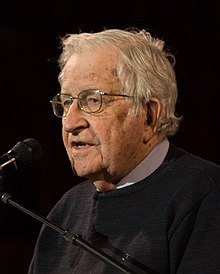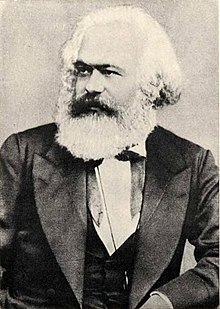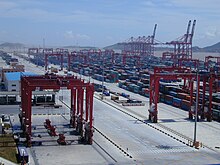Free trade
Appearance
(Redirected from Free-trade)









3. The removal, so far as possible, of all economic barriers and the establishment of equality of trade conditions among all the nations consenting to the peace and associating themselves for its maintenance. ~ Woodrow Wilson
Free trade is a trade policy that does not restrict imports or exports. It can also be understood as the free market idea applied to international trade.
Quotes
[edit]- The US is sort of the flag-bearer for capitalism and free markets, the US continues to be a very important part of a global industry that is interconnected, that is dealing with a fungible commodity which is crude oil. So having equalisation through free trade is very healthy for oil.
- Khalid A. Al-Falih, In an interview with Financial Times [1] (18 November 2016)
- Why are we free-traders? ... We are satisfied that it is right because it gives the freest play to individual energy and initiative and character and the largest liberty both to producer and consumer. We say that trade is injured when it is not allowed to follow its natural course, and when it is either hampered or diverted by artificial obstacles. ... We believe in free trade because we believe in the capacity of our countrymen. That at least is why I oppose protection root and branch, veiled and unveiled, one-sided or reciprocal. I oppose it in any form. Besides we have experience of fifty years, during which our prosperity has become the envy of the world.
- Henry Campbell-Bannerman, speech in Bolton (15 October 1903), quoted in The Times (16 October 1903), p. 6
- Economists have, in fact, devoted a lot of effort to documenting how international differences in economic conditions change as national governments lower the barriers that limit trade across countries. Much of international trade theory attempts to imagine what happens when countries allow unrestricted flows of goods and capital across national boundaries. One common theme in these models, which has greatly influenced economic policy, is that the removal of restrictions on such flows increases global income and tends to equalize prices and wages across countries.
Decades of experience with various trade liberalization policies, however, do not seem to have had as much of an impact on global income or on international wage inequality as the proponents of free trade would have expected.- George J. Borjas, “Immigration and Globalization: A Review Essay”, Journal of Economic Literature, vol. 53, no. 4, (December 2015), p. 961
- Almost all of today's rich countries used tariff protection and subsidies to develop their industries. Interestingly, Britain and the USA, the two countries that are supposed to have reached the summit of the world economy through their free-market, free-trade policy, are actually the ones that had most aggressively used protection and subsidies.
- Ha-Joon Chang, Kicking Away the Ladder, post-autistic economics review, issue no. 15, 1 September 2002, article 3
- The history of capitalism has been so totally re-written that many people in the rich world do not perceive the historical double standards involved in recommending free trade and free marke to developing countries.
- Ha-Joon Chang, Bad Samaritans: The Myth of Free Trade and the Secret History of Capitalism, Prologue, p. 16 (2008)
- Britain and the US are not the homes of free trade; in fact, for a long time they were the most protectionist countries in the world. Not all countries have succeeded through protection and subsidies, but few have done so without them. For developing countries, free trade has a rarely been a matter of choice; it was often an imposition from outside, sometimes even through military power. Most of them did very poorly under free trade; they did much better when they used protection and subsidies. The best-performing economies have been those that opened up their economies selectively and gradually. Neo-liberal free-trade free-market policy claims to sacrifice equity for growth, but in fact it achieves neither; growth has slowed down in the past two and a half decades when markets were freed and borders opened.
- Ha-Joon Chang, Bad Samaritans: The Myth of Free Trade and the Secret History of Capitalism, Prologue, p. 17 (2008)
- Rich countries have 'kicked away the ladder' by forcing free-market, free-trade policies on poor countries. Already established countries do not want more competitors emerging through the nationalistic policies they themselves successfully used in the past.
- Ha-Joon Chang, Bad Samaritans: The Myth of Free Trade and the Secret History of Capitalism, Ch. 2, Learning the right lessons from history, p. 61 (2008)
- As South Korea shows, active participation in international trade does not require free trade. Indeed, had South Korea pursued free trade and not promoted infant industries, it would not have become a major trading nation. It would still be exporting raw materials (e.g., tungsten ore, fish, seaweed) or low-technology, low-price products (e.g., textiles, garments, wigs made with human hair) that used to be its main export items in the 1960s.
- Ha-Joon Chang, Bad Samaritans: The Myth of Free Trade and the Secret History of Capitalism, Ch. 3, More trade, fewer ideologies, p. 82 (2008)
- The importance of international trade for economic development cannot be overemphasized. But free trade is not the best path to economic development. Trade helps economic development only when the country employs a mixture of protection and open trade, constantly adjusting it according to its changing needs and capabilities. Trade is simply too important for economic development to be left to free trade economists.
- Ha-Joon Chang, Bad Samaritans: The Myth of Free Trade and the Secret History of Capitalism, Ch. 3, More trade, fewer ideologies, p. 83 (2008)
- So, recently, though it wasn’t reported here, there were negotiations with Australia to establish what’s called a free trade agreement.... The negotiations were held up for some time because the United States was objecting to Australia’s highly efficient health care system. ... Why was the U.S. objecting to the Australian system? Well, because the Australian system is evidence-based... They have to provide evidence that the drug actually does something, that it is better than some cheaper thing that’s already on the market. That evidence-based approach, the U.S. negotiators argued, is interference with free markets, because corporations must have the right to deceive... The claim itself is kind of amusing, I mean, even if you believe the free market rhetoric for a moment. The main purpose of advertising is to undermine markets. If you go to graduate school and you take a course in economics, you learn that markets are systems in which informed consumers make rational choices. That’s what’s so wonderful about it. But that’s the last thing that the state corporate system wants. It is spending huge sums to prevent that.
- As the most powerful state, the U.S. makes its own laws, using force and conducting economic warfare at will. It also threatens sanctions against countries that do not abide by its conveniently flexible notions of "free trade." In one important case, Washington has employed such threats with great effectiveness (and GATT approval) to force open Asian markets for U.S. tobacco exports and advertising, aimed primarily at the growing markets of women and children. The U.S. Agriculture Department has provided grants to tobacco firms to promote smoking overseas. Asian countries have attempted to conduct educational anti-smoking campaigns, but they are overwhelmed by the miracles of the market, reinforced by U.S. state power through the sanctions threat. Philip Morris, with an advertising and promotion budget of close to $9 billion in 1992, became China's largest advertiser. The effect of Reaganite sanction threats was to increase advertising and promotion of cigarette smoking (particularly U.S. brands) quite sharply in Japan, Taiwan, and South Korea, along with the use of these lethal substances. In South Korea, for example, the rate of growth in smoking more than tripled when markets for U.S. lethal drugs were opened in 1988. The Bush Administration extended the threats to Thailand, at exactly the same time that the "war on drugs" was declared; the media were kind enough to overlook the coincidence, even suppressing the outraged denunciations by the very conservative Surgeon-General. Oxford University epidemiologist Richard Peto estimates that among Chinese children under 20 today, 50 million will die of cigarette-related diseases, an achievement that ranks high even by 20th century standards.
- Noam Chomsky, In Tony Evans (ed.), Human Rights Fifty Years on: A Reappraisal, 1997
- When you make foreign wine more expensive, domestic manufacturers can sell their wine at a higher price. The same with washing machines and solar panels and chairs. Anything that is in competition with an import will also get more expensive.
- Kimberly Clausing as quoted by Ronald Brownstein “Trump’s Plan to Supercharge Inflation”, The Atlantic, (6/2/2024)
- Free Trade! What is it? Why, breaking down the barriers that separate nations; those barriers, behind which nestle the feelings of pride, revenge, hatred, and jealousy, which every now and then burst their bounds, and deluge whole countries with blood; those feelings which nourish the poison of war and conquest, which assert that without conquest we can have no trade, which foster that lust for conquest and dominion which sends forth your warrior chiefs to scatter devastation through other lands, and then calls them back that they may be enthroned securely in your passions, but only to harass and oppress you at home.
- Richard Cobden, speech at Covent Garden (28 September 1843), quoted in John Bright and J. E. Thorold Rogers (eds.), Speeches on Questions of Public Policy by Richard Cobden, M.P. Volume I (1908), p. 40
- Never was the military spirit half so rampant in this country since 1815 as at the present time. Look at the news from Rangoon...This makes 5400 persons killed by our ships in the East during the last five years, without our having lost one man by the butcheries. Now give me Free Trade as the recognized policy of all parties in this country, and I will find the best possible argument against these marauding atrocities.
- Richard Cobden, 'How Wars are got up in India' (1853), The Political Writings of Richard Cobden (1903), pp. 457-8
- If I were five-and-twenty or thirty, instead of, unhappily, twice that number of years, I would take Adam Smith in hand—I would not go beyond him, I would have no politics in it—I would take Adam Smith in hand, and I would have a League for free trade in Land just as we had a League for free trade in Corn. You will find just the same authority in Adam Smith for the one as for the other; and if it were only taken up as it must be taken up to succeed, not as a political, revolutionary, Radical, Chartist notion, but taken up on politico-economic grounds, the agitation would be certain to succeed; and if you apply free trade in land and to labour too—that is, by getting rid of those abominable restrictions in your parish settlements, and the like—then, I say, the men who do that will have done for England probably more than we have been able to do by making free trade in corn.
- Richard Cobden, Speech at Rochdale (23 November 1864), quoted in John Bright and J. E. Thorold Rogers (eds.), Speeches on Questions of Public Policy by Richard Cobden, M.P. Volume II (1908), p. 493
- Free trade consists simply in letting people buy and sell as they want to buy and sell. It is protection that requires force, for it consists in preventing people from doing what they want to do. Protective tariffs are as much applications of force as are blockading squadrons, and their object is the same—to prevent trade. The difference between the two is that blockading squadrons are a means whereby nations seek to prevent their enemies from trading; protective tariffs are a means whereby nations attempt to prevent their own people from trading. What protection teaches us, is to do to ourselves in time of peace what enemies seek to do to us in time of war.
- Henry George, Protection or Free Trade?, Ch. 6. Full text online (1886)
- People commonly think of neoliberalism as an ideology that promotes totally free markets, where the state retreats from the scene and abandons all interventionist policies. But if we step back a bit, it becomes clear that the extention of neoliberalism has entailed powerful new forms of state intervention. The creation of a global 'free market' required not only violent coups and dictatorships backed by Western governments, but also the invention of a totalizing global bureaucracy – the World Bank, the IMF, the WTO and bilateral free-trade agreements – with reams of new laws, backed up by the military power of the United States. In other words, an unprecedented expansion of state power was necessary to force countries around the world to liberalize their markets against their will. As the global south has known ever since the Opium Wars in 1842, when British gunboats invaded China in order to knock down China's trade barriers, free trade has never actually been about freedom. On the contrary, as we have seen, free trade has a tendency to gradually undermine national sovereignty and electoral democracy.
- Free trade is profoundly based on the assumption of equilibrium conditions and in particular that wages always fall to their strict economic level. If they do not, and if for several reasons we do not desire them to, then it is only by means of a tariff that the ideal distribution of resources between different uses, which free trade aims at, can be achieved; and there is an unanswerable theoretical case for a countervailing import duty (and also for an export bounty) equivalent to the difference between the actual wage and the economic wage. ... I am no longer a free trader – and I believe that practically no-one else is – in the old sense of the term to the extent of believing in a very high degree of national specialisation and in abandoning any industry which is unable for the time being to hold its own. Where wages are immobile, this would be an extraordinarily dangerous doctrine to follow.
- John Maynard Keynes to Ramsay MacDonald (July 1930), quoted in The Collected Writings of John Maynard Keynes, Volume 20: Activities, 1929–1931: Rethinking Employment and Unemployment Policies, ed. D. Moggridge (1981), pp. 379–380
- If Boeing got a big head start on the 707 from multibillion-dollar military contracts to develop an air force transport, is that a sin against free trade?
- Robert Kuttner, The Economic Illusion, Chapter 3, Trade, p. 96 (1984)
- Technological advance often thrives in sheltered and subsidized markets, which defy free trade.
- Robert Kuttner, The Economic Illusion, Chapter 3, Trade, p. 97 (1984)
- We are already well down the road toward a managed-trade regime. It would be far better to acknowledge that reality, and seek a set of reasonable rules, than to pretend that Ricardian trade is the norm and allow mercantilist states to overwhelm U.S. industry and ratchet down wages, in the name of free trade.
- Robert Kuttner, The Economic Illusion, Chapter 3, Trade, p. 124 (1984)
- Free Trade is a great pacificator. We have had many quarrels, many causes of quarrels, during the last fifty years, but we have not had a single war with any first-class Power. Free Trade is slowly but surely cleaving a path through the dense and dark thicket of armaments to the sunny land of brotherhood amongst nations.
- David Lloyd George, speech in Manchester (21 April 1908), quoted in Better Times: Speeches by the Right Hon. D. Lloyd George, M.P., Chancellor of the Exchequer (Hodder & Stoughton, 1910), p. 43
- Free trade, one of the greatest blessings which a government can confer on a people, is in almost every country unpopular.
- Thomas Babington Macaulay, 1st Baron Macaulay, Essay on Mitford's History of Greece (1824)
- If soldiers are not to cross international boundaries, goods must do so. Unless shackles can be dropped from trade, bombs will be dropped from the sky.
- Otto T. Mallery, "Economic Union and Enduring Peace," Annals 216 (July 1941): 125-134; p. 125.
- The bourgeoisie, wherever it has got the upper hand, has put an end to all feudal, patriarchal, idyllic relations. It has pitilessly torn asunder the motley feudal ties that bound man to his “natural superiors,” and has left no other bond between man and man than naked self-interest, than callous “cash payment.” It has drowned the most heavenly ecstasies of religious fervor, of chivalrous enthusiasm, of philistine sentimentalism, in the icy water of egotistical calculation. It has resolved personal worth into exchange value, and in place of the numberless indefeasible chartered freedoms, has set up that single, unconscionable freedom—Free Trade.
- Karl Marx, The Manifesto of the Communist Party (1848)
- But, in general, the protective system of our day is conservative, while the free trade system is destructive. It breaks up old nationalities and pushes the antagonism of the proletariat and the bourgeoisie to the extreme point. In a word, the free trade system hastens the social revolution. It is in this revolutionary sense alone, gentlemen, that I vote in favor of free trade.
- "Free trade" is a slogan used to attack practices designed by competitor economies to protect their own interests.
- David McNally, Another World Is Possible : Globalization and Anti-capitalism, Chapter 2, Globalization - It's Not About Free Trade, p. 33 (2002)
- Technological advance often thrives in sheltered and subsidized markets, which defy free trade.
- Chapter 3, Trade, p. 97
- "Free trade" is a policy imposed on the weakest and evaded by the most powerful.
- David McNally, Another World Is Possible : Globalization and Anti-capitalism, Chapter 2, Globalization - It's Not About Free Trade, p. 33 (2002)
- Behind their fluffy rhetoric about free trade and free markets lurks a hostility toward freedom for ordinary people — and a love affair with police and prisons.
- David McNally, Another World Is Possible : Globalization and Anti-capitalism, Chapter 2, Globalization - It's Not About Free Trade, p. 52 (2002)
- I believe strongly in free trade but it also has to be fair trade. The first Republican President, Abraham Lincoln, warned that the "abandonment of the protective policy by the American Government [will] produce want and ruin among our people." Lincoln was right -- and it is time we heeded his words. I am not going to let America and its great companies and workers, be taken advantage of anymore.
- Donald Trump, Address to Joint Session of Congress, (February 28, 2017)
- The program of the world's peace, therefore, is our program; and that program, the only possible program, all we see it, is this: [...]
3. The removal, so far as possible, of all economic barriers and the establishment of equality of trade conditions among all the nations consenting to the peace and associating themselves for its maintenance.- Woodrow Wilson, in his "Fourteen Points" speech of 1918


